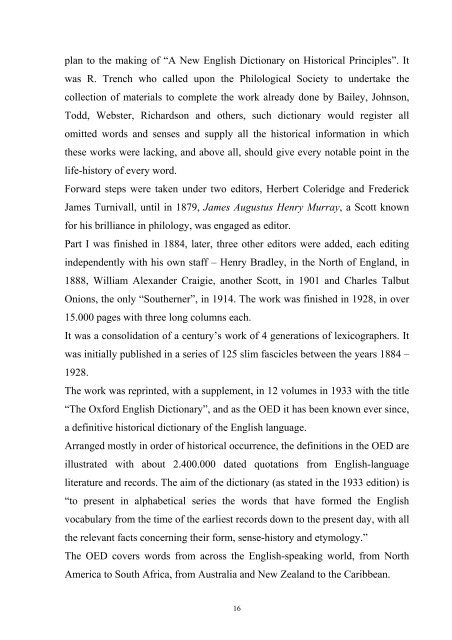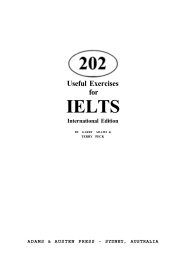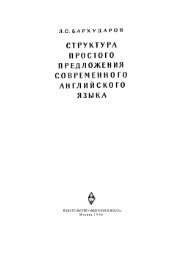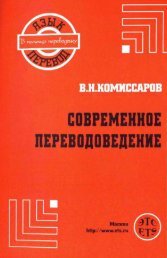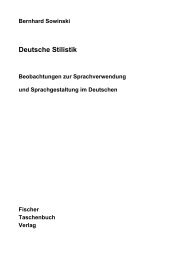Lexicography
Lexicography
Lexicography
You also want an ePaper? Increase the reach of your titles
YUMPU automatically turns print PDFs into web optimized ePapers that Google loves.
plan to the making of “A New English Dictionary on Historical Principles”. It<br />
was R. Trench who called upon the Philological Society to undertake the<br />
collection of materials to complete the work already done by Bailey, Johnson,<br />
Todd, Webster, Richardson and others, such dictionary would register all<br />
omitted words and senses and supply all the historical information in which<br />
these works were lacking, and above all, should give every notable point in the<br />
life-history of every word.<br />
Forward steps were taken under two editors, Herbert Coleridge and Frederick<br />
James Turnivall, until in 1879, James Augustus Henry Murray, a Scott known<br />
for his brilliance in philology, was engaged as editor.<br />
Part I was finished in 1884, later, three other editors were added, each editing<br />
independently with his own staff – Henry Bradley, in the North of England, in<br />
1888, William Alexander Craigie, another Scott, in 1901 and Charles Talbut<br />
Onions, the only “Southerner”, in 1914. The work was finished in 1928, in over<br />
15.000 pages with three long columns each.<br />
It was a consolidation of a century’s work of 4 generations of lexicographers. It<br />
was initially published in a series of 125 slim fascicles between the years 1884 –<br />
1928.<br />
The work was reprinted, with a supplement, in 12 volumes in 1933 with the title<br />
“The Oxford English Dictionary”, and as the OED it has been known ever since,<br />
a definitive historical dictionary of the English language.<br />
Arranged mostly in order of historical occurrence, the definitions in the OED are<br />
illustrated with about 2.400.000 dated quotations from English-language<br />
literature and records. The aim of the dictionary (as stated in the 1933 edition) is<br />
“to present in alphabetical series the words that have formed the English<br />
vocabulary from the time of the earliest records down to the present day, with all<br />
the relevant facts concerning their form, sense-history and etymology.”<br />
The OED covers words from across the English-speaking world, from North<br />
America to South Africa, from Australia and New Zealand to the Caribbean.<br />
16


